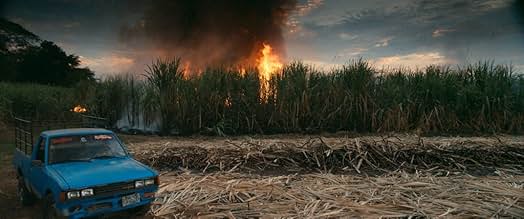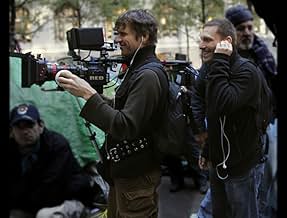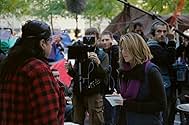Ein Blick auf sieben Gemeinschaften auf der ganzen Welt mit dem Vorschlag, dass wir den Klimawandel als Chance begreifen, unser gescheitertes Wirtschaftssystem in etwas radikal Besseres zu t... Alles lesenEin Blick auf sieben Gemeinschaften auf der ganzen Welt mit dem Vorschlag, dass wir den Klimawandel als Chance begreifen, unser gescheitertes Wirtschaftssystem in etwas radikal Besseres zu transformieren.Ein Blick auf sieben Gemeinschaften auf der ganzen Welt mit dem Vorschlag, dass wir den Klimawandel als Chance begreifen, unser gescheitertes Wirtschaftssystem in etwas radikal Besseres zu transformieren.
- Regie
- Drehbuch
- Hauptbesetzung
- Auszeichnungen
- 2 Gewinne & 4 Nominierungen insgesamt
Empfohlene Bewertungen
This Changes Everything is a well made and well researched film. And although I do not normally give movie reviews, I consider this film the exception.
This is an extremely important film for our time. Do not miss the opportunity to view it. This is not the time for hopelessness or complacency or business as usual. Action is called for and we can do it together! Please do yourself and your family a favor. The future of our children and our children's children is in our hands.
The film begins by discussing the issue of how women are portrayed in the media. It was stated that "of the top grossing films of 2018, 85% of writers were males (Donahue, 2019)." That being said, most movies and T. V. shows portray women through the eyes of a man. This then leads the film to shift towards personal experiences from many famous actresses such as Reese Witherspoon, Chloe Grace Moretz, and Taraji P. Henson. By incorporating these stories, Donahue does a great job highlighting how difficult it was for these actresses and directors to feel comfortable in their work space.
The film then goes on and discusses the misrepresentation of women in a variety of ways, touching on how there is a lack of ethnic backgrounds in women characters, sexualization of women and how women are bound to certain characteristics and roles in movies and T. V. shows. The statistics that were mentioned in this portion of the film was shocking. It would be hard to argue with the statistics that Geena Davis had discovered. This is especially true when she had mentioned that "out of the 1010 top grossing g rated movies from 1990-2005, 72% of all speaking roles were male (Donahue, 2019)." It really makes you wonder what we are teaching our children and the generations to come.
Another strong point this film was able to integrate was the male perspective, specifically that of the fox chairman, John Landgraf. When Landgraf appears on screen, the audience is able to see an example of how change can happen when one begins to realize the extent of the issue. Landgraf also serves as an example to other male figures in this industry. He is used to help inspire other men to step in and help women have a voice and fight this battle.
In all, the film did a very good job incorporating a variety of actresses' opinions and personal experiences, along with statistics that are big and clear on the screen. However, the film lacks intersectionality, thus resulting in a less persuasive argument. Intersectionality is a term that was created by Kimberle Crenshaw in order to explain how there are a variety of categories that play a role in a discrimination, therefore, bringing up the point that discrimination is not rooted from one place.
Although the film includes actresses such as Taraji P. Henson, Sandra Oh and Amandla Stenberg, most of the actresses and directors were white. Therefore, Donahue had failed to include testimonies from those with different backgrounds. In addition, the film does not include those with disabilities, those of different sexual backgrounds, those of different age groups and those who have different appearances. Let alone, it does not even include statistics about how these different backgrounds play a role in gender discrimination. Without the inclusion of these individuals, the argument that is being made seems one-sided. Therefore, those in the audience that cannot relate would question whether or not this topic is worth getting involved in.
If the film had incorporated an intersectional lens, they would have been able to instill a deep sense of inclusion and be able to tackle the issue of gender discrimination at all angles. It would also elicit greater emotions and improve the directors use of pathos because the film would be more relatable to those in the audience that are not white, skinny or even heterosexual. If this film wants to inspire people to break the gender discrimination in the entertainment industry, it must first touch the heart of all.
Works Cited This Changes Everything. Dir Tom Donahue. 2019. Netflix. Web. 8 September 2021.
The BAD: there is too much doom and gloom in this movie, with only a few positive solutions offered on how to battle and STOP GLOBAL WARMING.
Please do try and watch it though, because this documentary is intelligently told and full of wisdom, however depressing in character.
Only recommended for those who like to know about all the depressing problems that block us from changing everything about global warming.
The first 5 minutes or so of this movie really got my hopes up. Klein's smooth narrator voice explained how she doesn't really like environmental movies (me neither!), how seeing ice bears looking for ice doesn't really do it for her (a movie that criticizes some clichés, neat!) and in a crescendo she boldly proposes that everything we've thought to be the cause of the climate change is wrong!
Then the actual movie begins and Klein's big twist turns out to be: capitalism is to blame. So not really a twist at all. And then we go on to learn... absolutely nothing new. The movie is entirely based on socialism vs. capitalism, which leaves little to no room for discussing facts or any deeper insights. Not a single scientist or researcher is interviewed.
Instead a rather uninteresting conflict between a Canadian Native American tribe and the local authorities is given a large amount of time. I say uninteresting because the only part of the conflict we get to see are some awkward telephone conversations and a short conversation at a parking lot. To make it worse Klein introduces the tribe as THE alternative to the evil capitalism and the modern society. They know how to respect the earth and take care of it (hello biggest cliché ever....) and so on. Then the next shot shows one of them driving her enormous truck, which I presume is not run on solar power. A similar scene takes place in Greece where some environmentalists sit in a forest pouring some liquid or another from an old Coca-Cola (plastic) bottle from their (plastic) cups.
Now don't get me wrong. I agree with Klein that marginalized people do suffer more. And I'm sure the Native American tribes and other activists shown are very much concerned with the environment. But by not addressing the discrepancy between how many people wish to save the environment and yet want to maintain a modern lifestyle (which includes cars and other modern consumption items), the movie leaves a gaping hole in the narrative of why the world looks like it does.
All this focus on the little man (activists) versus capitalism also leaves very little room for examination of how societies should change. The movie goes to Germany as it's one and only role model for change, where, according to Klein, everything is now just perfect since they stopped using nuclear power (?!) (and now relies on sun and wind power. Firstly nuclear power has literally no carbon emissions, and is also a thousand times more efficient than wind or solar power. Secondly these alternative sources may supply 30% of all Germany's needs on the best of days, but the rest of the time Germany has to compensate with good old coal, which as seen previously in the movie, shouldn't really be something to keep around as a good energy source.
Lastly I believe the thesis that environmental destruction began with the industrial revolution is severely dishonest. That is to deny all the iron mines, all the 'deforestification' and desertification (caused by agriculture), all the specie extinction etc that have previously existed due to human activities. For anyone interested in a less superficial understanding of the subject I'd recommend Jared Diamond's book "Collapse", in which he explains how different societies throughout histories have dealt with environmental destruction.
Wusstest du schon
- WissenswertesThis marks Seth MacFarlane's first documentary film.
- Zitate
Herself - Narrator: Could it be that we are not the masters, after all? That we are just guests here on Earth, and that we can get evicted for bad behavior?
Top-Auswahl
Details
Box Office
- Bruttoertrag in den USA und Kanada
- 16.692 $
- Eröffnungswochenende in den USA und in Kanada
- 9.770 $
- 4. Okt. 2015
- Weltweiter Bruttoertrag
- 16.692 $
- Laufzeit1 Stunde 29 Minuten
- Farbe



















